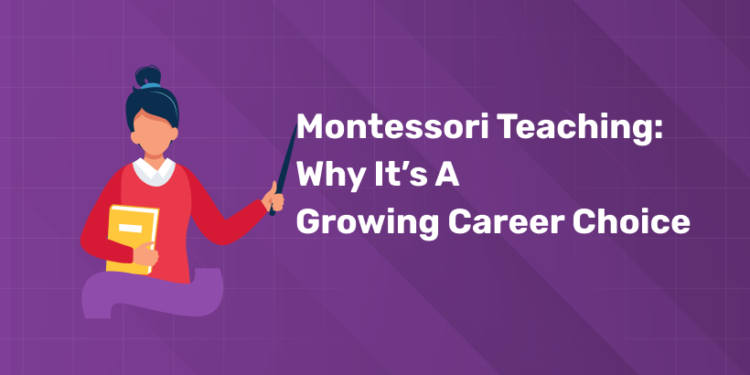Table of Contents
Introduction
Education is always evolving and as we approach 2026 Montessori teaching is becoming a top career choice for educators and would be teachers. Montessori method developed by Dr. Maria Montessori over a century ago is child centred, independent and hands on. In today’s fast pace world where traditional educational models often fail to address the individual needs of children Montessori education is a breath of fresh air. This blog post will explore why Montessori teaching is gaining popularity in 2026, global demand, emerging trends and the role of training programs like Entri’s Montessori Teacher Training Course.
Register for the Entri Elevate Montessori Teacher Training Program! Click here to join!
Why Montessori Education is Popular in 2026
1: What is the primary focus of the first plane of development in the Montessori method?
Montessori education has always been about respecting a child’s natural development and fostering a love for learning through freedom and exploration. As we move into 2026 several factors are contributing to its popularity:
1. Child Centred Learning
In a world where standardized testing and rigid curricula are the norm Montessori education puts the individual needs of the child first. This allows children to progress at their own pace which is essential for fostering intrinsic motivation and a lifelong love for learning. Parents and educators are realizing the importance of personalized education and Montessori is the choice.
2. Holistic Development
Montessori education is not just about academic achievement it’s also about social, emotional and physical development. This holistic approach gives children life skills like critical thinking, problem solving and collaboration. As educators and parents are looking to raise well rounded individuals the demand for Montessori trained teachers is on the rise.
3. Preparing for a Changing World
The future job market will require skills that are often missing in traditional educational systems. Montessori education develops adaptability, creativity and resilience – skills that are becoming more and more important in a fast changing world. As more parents and educational institutions realize this need Montessori teaching is becoming a top career choice.
Get Certified & Start Your Montessori Career
Montessori Teacher Training Course by Entri App: Gain expert skills, earn certification, and kickstart your teaching career.
Join Now!Global Demand for Montessori Teachers
The demand for Montessori teachers is not limited to a particular region it’s a global trend. Several factors are contributing to this growing demand:
1. Montessori Schools are Expanding
As Montessori education is becoming more popular more Montessori schools are being set up worldwide. From urban to rural areas these schools are popping up everywhere and need a steady supply of trained Montessori teachers.
2. International Recognition
Montessori education is getting international recognition as an effective early childhood education method. Countries like U.S., Canada and even India are adopting Montessori approach and hence there is a surge in teacher training programs. This global outreach is creating many job opportunities for qualified Montessori teachers.
3. Government Backing
In many areas government are supporting Montessori education as part of their early childhood education programs. This endorsement not only validates the Montessori approach but also will lead to more Montessori schools being set up hence more demand for teachers.
Montessori Trends
Looking to 2026 and here are the trends:
1. Technology
While Montessori education has always been about hands on learning and real life experiences, technology is becoming more integrated. Digital tools and resources are being used to enhance the learning experience without compromising the Montessori philosophy. This means educators need to be able to blend traditional with modern.
AR/VR Integration
Montessori classrooms use AR/VR for immersive geography trips, like virtual solar system explorations, or history recreations such as walking through ancient Rome, enhancing sensory learning without replacing physical materials. Tools like Microsoft HoloLens allow students to “enter” the human body for biology, self-correcting via Montessori’s error control. This balances digital immersion with hands-on work, preparing kids for tech futures.
Personalization Tools
Transparent Classroom and Montessori Compass track progress, suggesting materials based on patterns (e.g., repeated errors in pink tower), aiding teachers in tailoring paths. AI enhances observation for readiness, preserving independence.
2. Sustainability
With the growing awareness of environmental issues, Montessori education is including sustainability in the curriculum. Educators are teaching children about environmental stewardship and encouraging them to take responsibility for the planet. Montessori teachers who know about sustainability will be in demand.
3. Mental Health
Mental health in education is becoming more important and Montessori is no exception. Teachers are being trained to identify and address the emotional needs of their students, create supportive learning environments. This trend highlights the relevance of Montessori principles in promoting well being and resilience in children.
Emotional Intelligence Focus
Programs emphasize EQ via mindfulness activities and peer mediation, using observation to track social growth and resilience amid 2026 challenges like digital overload. Data tools alert teachers to emotional cues, supporting personalized interventions without direct child interference. This nurtures well-being alongside academics.
4. Lifelong Learning
Montessori education instils a love of learning that goes beyond the classroom. Educators are creating a culture of lifelong learning where both teachers and students are encouraged to learn for life. This trend is especially good for those entering the profession as it fits with current thinking on personal and professional development.
India Training Details
Eligibility stays 10+2 (no experience needed), with 2026 online diplomas covering ages 2½-6 via NIOS-recognized programs. IMTC-Chennai’s July 2025 Primary Diploma continues into 2026 cohorts, adding parent/NGO workshops; others like Delhi/ Mumbai centres offer flexible virtual options. Ideal for Kerala professionals entering education.
Get Certified & Start Your Montessori Career
Montessori Teacher Training Course by Entri App: Gain expert skills, earn certification, and kickstart your teaching career.
Join Now!Salary Insights India
Montessori teachers in India earn an average of ₹3-10 lakhs annually in 2026, with entry-level at ₹3-5 lakhs in cities like Kochi or Bangalore (₹2-3.5 lakhs rural), mid-career ₹5-8 lakhs, and seniors up to ₹12 lakhs in private schools. Urban areas pay 20% more, per job boards, adding practical career details absent from the blog.
| Experience Level | City Salary (₹ lakhs/year) | Rural Salary (₹ lakhs/year) |
| Entry (0-3 yrs) | 3 to 5 | 2 to 3.5 |
| Mid (4-8 yrs) | 5 to 8 | 4 to 6 |
| Senior (9+ yrs) | 8 to 12 | 6 to 9 |
Montessori Training
As Montessori teachers are in high demand so is the need for good training. Entri’s Montessori Teacher Training Course is designed to equip aspiring teachers with the skills and knowledge to succeed in this field.
What We Offer
- Thorough Curriculum: Entri Montessori Teacher Training Course covers child development, Montessori philosophy, classroom management and observation skills. Our curriculum is designed to prepare you to cater to all kinds of students you will have in future.
- Flexible Learning: With a mix of live and recorded sessions, you can learn at your own pace. This is especially helpful for those who have other commitments like jobs or family responsibilities.
- Practical Experience: The course has a practicum component where you will get to experience Montessori classroom. Real life training is essential to build your confidence and competence to be a good educator.
- Global Recognition: Entri certificates are recognized globally, so you can work anywhere in the world. This is a big advantage in a competitive job market.
- Placement Support: Entri also provides placement support to help you get a teaching job after completing the training. This support system is especially helpful for those who are entering the workforce for the first time or transitioning from other careers.
Register for the Entri Elevate Montessori Teacher Training Program! Click here to join!
Conclusion
Montessori teaching is not just a job; it is a calling where educators can make a difference in children’s lives. As we approach 2026 the demand for Montessori trained teachers is increasing because of the growing trend towards child centric education that focuses on holistic development and prepares students for a changing world.
If you are looking to start a career in education Montessori teaching is a fulfilling one. Enrol in a good training program like Entri’s Montessori Teacher Training Course and get the skills and knowledge to succeed in this field. With a strong foundation in Montessori principles and practical experience you can start your journey that will shape your career and the future of education itself.
Ready to start your Montessori teaching career? Explore Entri’s Montessori Teacher Training Course today. Inspire the next generation and be a part of a global movement that nurtures independent, lifelong learners.
Get Certified & Start Your Montessori Career
Montessori Teacher Training Course by Entri App: Gain expert skills, earn certification, and kickstart your teaching career.
Join Now!Frequently Asked Questions
What is the Montessori method, and how does it differ from traditional education?
The Montessori method, developed by Dr. Maria Montessori, emphasizes child-centered learning, where children are encouraged to explore and learn at their own pace. Unlike traditional education, which often relies on standardized testing and a one-size-fits-all curriculum, Montessori education focuses on individual developmental needs. It promotes hands-on, experiential learning and fosters independence, creativity, and critical thinking. The prepared environment allows children to choose activities that interest them, nurturing their natural curiosity and desire to learn.
What qualifications do I need to become a Montessori teacher?
To become a Montessori teacher, the basic requirement is usually a high school diploma or equivalent. However, many Montessori training programs, including Entri’s Montessori Teacher Training Course, require or recommend a bachelor’s degree in education or a related field. Completing a recognized Montessori teacher training program is essential to gain the specific skills and knowledge needed for the role. Additionally, some schools may prefer candidates with experience working with children or prior teaching experience.
How long does it take to complete a Montessori Teacher Training Course?
The duration of Montessori Teacher Training Courses can vary. Entri’s Montessori Teacher Training Course, for example, is designed to be completed in six months. This time frame typically includes a combination of live and recorded sessions, practical experience, and assessments. The course structure allows for flexibility, catering to both full-time students and those balancing other commitments.
What are the career opportunities after completing a Montessori Teacher Training Course?
Graduates of Montessori Teacher Training Courses have a variety of career options. Many choose to work as Montessori teachers in preschools, kindergartens, or primary schools. Others may open their own Montessori schools or training centers. Additionally, some graduates pursue roles in educational consulting, curriculum development, or educational administration. The global recognition of Montessori certifications also opens opportunities for teaching abroad, expanding career prospects significantly.
Is Montessori education suitable for all children, including those with special needs?
Yes, Montessori education is designed to be inclusive and adaptable to meet the needs of all children, including those with special needs. The individualized approach allows educators to tailor learning experiences based on each child’s strengths and challenges. Montessori classrooms often feature multi-sensory materials and activities that support diverse learning styles. Additionally, the emphasis on social and emotional development helps all children build confidence and independence, creating a supportive environment for growth.
How does Entri's Montessori Teacher Training Course prepare educators for real-world teaching?
Entri’s Montessori Teacher Training Course provides a comprehensive curriculum that covers essential topics such as child development, classroom management, and Montessori philosophy. The course includes practical components, allowing students to gain hands-on experience in real Montessori classrooms. Live sessions facilitate interaction with experienced educators, while recorded materials allow for flexible learning. Additionally, Entri offers placement assistance to help graduates secure teaching positions, ensuring they are well-prepared to enter the workforce.
What is the cost of the Montessori Teacher Training Course at Entri, and are there any financial aid options available?
The cost of the Montessori Teacher Training Course at Entri can vary based on the specific program and certification sought. Typically, the starting fee is around ₹12,000. Entri aims to provide high-quality training at an affordable price, and there may be options for installment payments. Additionally, potential students are encouraged to inquire about any scholarships or financial aid opportunities that may be available to assist with course fees.
What types of skills will I develop through a Montessori Teacher Training Course?
Participants in a Montessori Teacher Training Course will develop a range of essential skills, including:
- Observation Skills: Learning to assess children’s developmental needs and interests accurately.
- Effective Communication: Building positive relationships with children, parents, and colleagues.
- Curriculum Development: Designing engaging and age-appropriate learning activities.
- Classroom Management: Creating a nurturing and organized learning environment.
- Creative Problem-Solving: Developing innovative approaches to engage children and foster their independence.
These skills are vital for becoming an effective Montessori educator.
Can I teach in a Montessori school without prior teaching experience?
Yes, prior teaching experience is not typically required to enroll in a Montessori Teacher Training Course. Many programs, including Entri’s, welcome individuals who are new to the field. While having experience working with children can be beneficial, the training course is designed to equip all aspiring educators with the necessary skills and knowledge to succeed in a Montessori environment.
How is the Montessori method evolving to meet the needs of modern education?
The Montessori method is continually evolving to adapt to the changing educational landscape. Current trends include the integration of technology in the classroom, which enhances learning without compromising Montessori principles. Sustainability is also becoming a significant focus, with educators teaching children about environmental responsibility. Additionally, there is an increasing emphasis on mental health and emotional well-being, ensuring that Montessori educators are equipped to support the holistic development of their students. These adaptations reflect the method’s flexibility and commitment to preparing children for the future.














